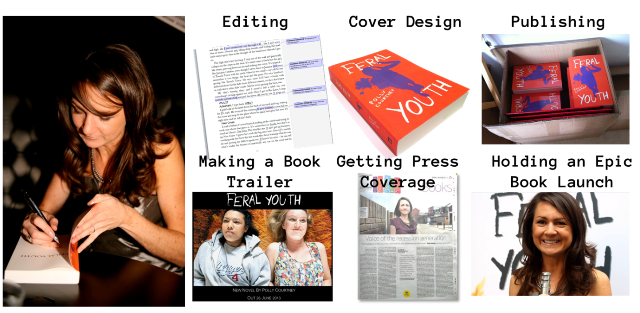
“As an author looking to self-publish, what’s the number one rule? Do what publishers do, but do it better.”
The trouble with self-publishing is that it's very easy to do badly. I'm talking about those books that have four typos on the first page; the ones with the amateurish cover designs. You know: the books you put down after half a chapter because the main character is driving you mad. I'm talking about those books that get held up by publishers as shining examples of why they still need to exist.
'See?' they jeer, scoffing at the wonky photograph on the front cover, with its tacky white border and laminated sheen. 'This is what happens when you bypass the publishers!'
Well, yes and no. Publishers have always provided a filter between the vast jumble of words out there and the bookshelves our readers peruse - a filter that may or may not be based on quality, depending on your point of view. Either way, they don't have to be the only ones policing the literary waters. Those of us who do choose to bypass the publishers - for whatever reason - should impose our own quality filters, out of respect for our readers and our fellow indie authors. Nobody wants to be part of an industry that is perceived as shoddy.
For me, self-publishing is about doing everything a traditional publisher does, but doing it better.
This means getting your book ripped apart by an editor, who will leave you to put it back together again. It means getting a professional designer to work on the book cover - even if you know your way around Photoshop. It means working out your best options for printing and/or ebook and executing on a well thought-through distribution plan, setting prices that work for you and your readers. It means marketing the hell out of your book in whatever ways make sense, based on your personality, your time, your budget and the type of readers you think you'll attract. Oh, and it also means laying on an epic book launch.
Sounds daunting, eh?
Don't worry; I've spent nearly ten years making mistakes so that you don't have to (if you read this blog series, that is). I muddled my way to the number 2 spot on Amazon back in 2006, which got me a book deal with HarperCollins. There, I learnt a lot about what works - and what doesn't. I've since returned to self-publishing for my latest work, Feral Youth, which has offered me more control over how my books are branded and enabled me to put into practice everything I've learnt.
It turns out, traditional publishers don't do everything in the most optimal way. They're big, which means they're not nimble. If you want to run a short price promotion, forget it; they'll take six months to get sign-off. If you think all your marketing will be taken care of when you're with the big boys, you're sadly mistaken. It would be nice if we still lived in those times, but these days you're expected to handle all the promotion yourself, using your initiatives and your 'platform'. Sure, the publisher takes care of your book cover design (and in my case, the title too), which can be a blessing and a curse. But even in the editing stage, although publishers use professionals, they only ever get one set of eyes on the manuscript at any one time. Books are subjective things… your readers might not think like your editor does.
I've divided the publishing journey into six parts:
- Editing Your Book
- Getting an Awesome Book Cover
- Publishing Your Book
- Getting Press Coverage
- Making a Book Trailer
- Holding an Epic Book Launch.
Each post has an accompanying video, which shows examples of the advice in action - often based on my own experiences publishing my latest novel, Feral Youth. Although this series won't cover everything you need to know about self-publishing professionally, it touches on the parts that matter most to me.
One big tip, before we get stuck in: Collaborate. As self-publishers, we don't need to do everything ourselves. In fact, it's a really bad idea to try and do everything ourselves. We head up the publishing house, which means we have the control, but we consult with experts to get things done properly. Right? Right!
Polly Courtney is the author of six novels, both self-published and traditionally published. In 2011, she walked out on her publisher, HarperCollins, in protest at the chick-lit branding of her books. She is currently working on the film adaptation of her latest novel, Feral Youth - the story of the London Riots through the eyes of a 15-year-old girl. She is a firm advocate of self-publishing, but only when it's done well.
Comments